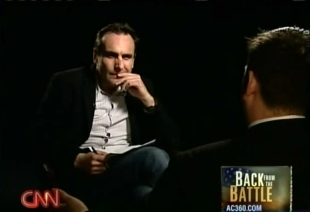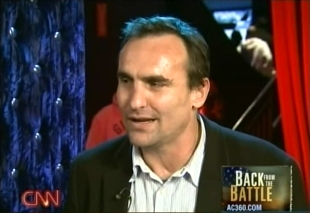AC360 Special: Back From the Battle

Length: 3:33
LARGE (41.4 MB) ----- SMALL (4.3 MB)
"Back From the Battle" is an AC360 special with two components: a series of reports about veterans' struggles as they return from Iraq and Afghanistan, and a concert put on for veterans by MTV & CNN at the Nokia Theater in New York City on October 23.
In the first clip, Michael does a follow-up with Staff Sergeant David Bellavia, who served in Iraq and whom Michael met when he was embedded with Alpha Company's 3rd Platoon during the second battle for Fallujah in November of 2004. Michael wrote a cover story for Time magazine, "Into the Hot Zone," and David wrote a book about the battle, House to House. The footage of the battle itself was filmed by Michael himself; the single still photo shown would be the work of Time magazine's Yuri Kozyrev, who was teamed with Michael in those days.
For the second clip, Anderson talks to Michael at the concert about David's story and the emotional toll of the war.
ANDERSON COOPER: We begin with one vet CNN's Michael Ware first met on the frontlines during the fight in Fallujah, one of the deadliest battles of the war. His name is David Bellavia, a former staff sergeant. He won the Silver Star and the Bronze Star for his service in Iraq, now an author and a veterans' activist. David is trying to help other vets as they come home. Take a look.
(BEGIN VIDEOTAPE)
MICHAEL WARE, CNN INTERNATIONAL CORRESPONDENT (voice-over): After surviving this, it can be hard to come home again.
UNIDENTIFIED MALE: Here's what we are going to do.
WARE: Staff Sergeant David Bellavia -- raising his rifle -- knows how that feels.
STAFF SGT. DAVID BELLAVIA, U.S. ARMY (RET.): Get back! Get back! Get back to flank.
I know when I walk down a street, I'm constantly thinking like I'm -- you know, what's going to happen when that window opens up. Once you know what the hardships of war are, you're hyper-vigilant, you're hyper-alert. And a man can't do that forever.
WARE: Bellavia fought in this, the battle of Fallujah in 2004, in intense house to house combat. He has a slew of medals for bravery, plus a nomination for America's highest award, the Medal of Honor. But after what he says was the hell of combat, his innocence is gone.
BELLAVIA: If you've been shot at before, you've heard the crack, you've heard the whine, you realize that no matter what happens, there are far better soldiers than I am, that got hit, that lost their lives. It is a crap shoot. It is total luck.
WARE: Out of the army now, he carries the survivor's guilt and seeks to return to his life.
BELLAVIA: You can never really enjoy it again. What's tranquility after you've been, you know, seen a rocket whizz by and you lost 37 guys, you know. I mean, it -- yeah, it's with you every day.
WARE: He's trying to make his experiences and those of his fighting generation mean something. For him, that meant writing a book and creating a group, Veterans for Freedom, to help other soldiers transition home again.
BELLAVIA: We have guys that legitimately need help -- traumatic brain injury, post traumatic stress, college money, whatever. We appreciate all the help, but the reality of the matter is our legacy and the fact that the way we are perceived as a veteran is far more important than any sort of care package you can give us.
WARE: The best thing America can do to help its troops, he says, is stop victimizing them.
BELLAVIA: I coach my son's soccer team and I had parents come up to me saying, you know, we're really uncomfortable, you know, with you around kids because, you know -- you know, you use language or you might be prone to rage or you might be -- I'm, like, whoa. You know, what is this all about? I'm good to go.
WARE: He also says soldiers need much better care when they come home, beyond the veterans' affairs system.
BELLAVIA: We can get these guys every -- literally, set up a coordination center when they come home and help them in every aspect, instead of them going to the VA, feeling like a number, feeling like a cog in a machine.
WARE: And if Washington or the community aren't helping these kids transition home enough, says Bellavia, then it's up to the veterans themselves.
BELLAVIA: We need to come to reality, grow up and realize that, you know what, there are things that we can do right now that can literally change the world, change our country, and we can take these horrible experiences to make sure that our kids don't go through it, you know, and we can actually make a difference.
WARE: And that, he says, is the veteran's ultimate fight.
BELLAVIA: Our generation is going to be judged by how -- not only how we fought but how we conduct ourselves when we come home.

Length: 3:16
LARGE (38.0 MB) ----- SMALL (3.9 MB)
ANDERSON COOPER: And Michael Ware joins us now. It's rare that you're able to actually follow someone from the battlefield and then hook up with them again. I mean, as a reporter that's a great thing to be able to follow up that long. MICHAEL WARE: It is, like you say, it's something unique. And after what some of us went through in that battle, like many others, there's a bond that is established. COOPER: That battle was an extraordinary battle. I mean, it was unlike any the U.S. has seen in many, many, many years. WARE: In so many ways, it's the defining battle of the Iraq war. Now, the Iraq war is many conflicts, many firefights. I mean, soldiers getting shot at all the time. But in terms of two forces, opposing each other, street-to-street -- and, I mean, not just house-to-house, but room-to-room, the battle of Fallujah was it. Otherwise, it's hit-and-run guerilla combat. And in that battle is where David and I met and we are still friends today. COOPER: What did David do? WARE: In that battle, something that David did to save the lives of the 20-odd men he was with earned him a nomination for America's highest award, the Medal of Honor. When al-Qaeda fighters lured his platoon into the house -- and we were with them -- they ambushed his men six feet away. And eventually, the platoon was pushed outside. It was David who went back inside and singlehandedly killed six al-Qaeda fighters, sometimes hand-to-hand. COOPER: Does he seem different now than when you met him in -- obviously, it's a different situation. WARE: Anderson, everybody is different. I mean, that's the thing. Whether you are nominated for the Medal of Honor, or whether you never leave the wire of your forward operating base, once you've been in that stuff, it stays with you forever. And I mean, I remember one vet wrote when he came home that once certain dark chambers of the heart are opened, they can never be closed again. So, David is not the same man he was when he went to war. None of us ever will be. COOPER: I mean, everybody has their own war, everybody sees their own slice of the war, one soldier once said to me. But there is a commonality of experience. I mean, the bond that people share. WARE: I mean, there really is a brotherhood, a fraternity. Now, you know, that can be overplayed and that can be devalued, the way people throw that word around. But in combat, that's what these kids are fighting for. There's a nobler cause, they're wearing the flag on their sleeve but at the end of the day, Anderson, it's you fighting for me and me fighting for you. I want to make sure you get home and I'm watching your back, and I know you, my brother, are doing the exact same thing. COOPER: And that's what a lot of the vets here tonight are saying they want to see for the vets who are returning home, that same sense of us looking out for them and them looking out for us, and people looking out for each other. WARE: And it's a very hard thing, because no matter how much people try back home, unless they've been there, there's going to be a distance. People cannot understand. And in fact, many of these veterans hope that their loved ones never do understand. They don't want their loved ones going through what they've been through. So, whilst that's a thing that protects their loved ones, it's also the thing that forever will keep a certain distance. So, it's just about hoping that people can come to understand and find a way for these guys to eventually make their way home, because home is never the same again, Anderson. COOPER: It's nice to have you back home as well, Michael Ware, you've been in Iraq a long, long time. WARE: My pleasure. Thank you. COOPER: Thanks for staying with it. Appreciate it.
